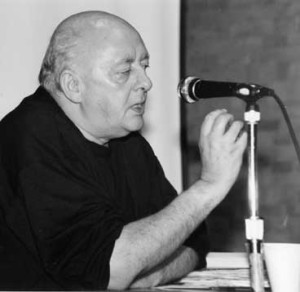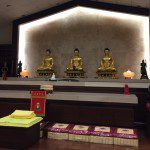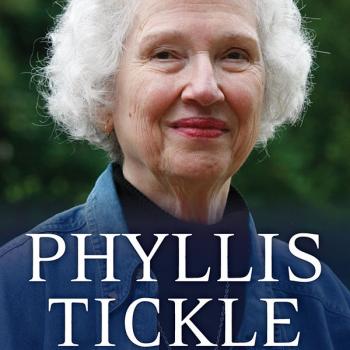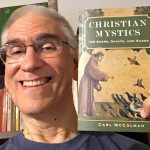I have learned of the passing of Father Kenneth Leech, who died on September 12, 2015 after a long illness.
He was born in 1939 and grew up in a secular home in the north of England. As a youth he was inspired by Alasdair MacIntyre (later famous for his renowned study of postmodern moral theory, After Virtue) who helped him realize that it is possible to have a critical, inquiring mind as a person of faith. He embraced the Anglo-Catholic tradition of the Church of England and was ordained a priest, and served most of his ministry in the same neighborhood of the east end of London, where over the course of his ministry he engaged with a variety of challenges, including homelessness, drug abuse, racism and religious prejudice (his neighborhood became a home for immigrants, particularly from the Muslim world).
Throughout his career Ken was a prolific writer; his early books dealt with topical issues like the drug problem, but early on he recognized that the youth culture of the sixties and seventies had a strong interest in spirituality, which led him to begin writing about the treasures of the Christian tradition. Perhaps his most significant book, Soul Friend, about the ministry of spiritual accompaniment, was published in 1977. He followed it up with True Prayer, True God, and probably my personal favorite, The Eye of the Storm: Spiritual Resources for the Pursuit of Justice. Many other books followed, with a splendid career-retrospective anthology published just a few years ago, Prayer and Prophecy: The Essential Kenneth Leech. If you’re new to Ken’s writings, that’s the book I suggest you start with.
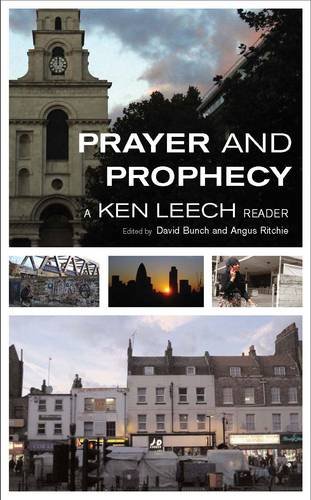
Prayer and Prophecy: those two words really sum up Ken’s ministry. He could effortlessly write about Julian of Norwich in one paragraph, and how the Church of England neglected the poor in the next. As an Anglo-Catholic, he stood unapologetically in a sociopolitical “left of center” context. Indeed, his Wikipedia page describes him as a “Christian socialist in the Anglo-Catholic tradition.”
But his context is important: Ken’s tireless work on behalf of the poor, the homeless, the addicted, the victims of racism or religious prejudice, was always anchored in his faith in Jesus Christ and his unwavering belief that the Church, the community of faith, is called to be a countersign to the “principalities and powers” of our world (which includes oppressive economic and political systems which keep some people marginalized even as they benefit those with privilege). Ken called himself a “community theologian,” recognizing that the best theology comes not from the ivory tower, but from the gritty realities of life on the street. Yet as a person of prayer and prophecy, Ken always understood that prayer came first.
Longterm readers of this blog will recognize the following amazing quotation from Fr. Ken, because I quote this all the time. But it’s so beautiful, so true, so important to my own understanding of contemplative spirituality, that it deserves being posted yet again. This comes from Ken’s book The Social God but you’ll also find it in Prayer and Prophecy.
Contemplation has a context: it does not occur in a vacuum. Today’s context is that of the multinational corporations, the arms race, the strong state, the economic crisis, urban decay, the growing racism, and human loneliness. It is within this highly deranged culture that contemplatives explore the waste of their own being. It is in the midst of chaos and crisis that they pursue the vision of God and experience the conflict which is at the core of the contemplative search. They become part of that conflict and begin to see into the heart of things. The contemplative shares in the passion of Christ which is both an identification with the pain of the world and also the despoiling of the principalities and powers of the fallen world-order.
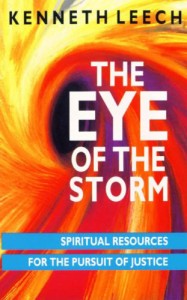
I only met Father Ken a few times; we met briefly at a seminary bookstore by chance in the early 1990s; but a few years later when I was receiving spiritual direction from Emmett Jarrett (another Christian rabble-rouser), I had the chance to spend some time with Ken on a couple of occasions. Emmett had studied with Ken and the two were friends, so when Ken traveled in America he usually would stay with Emmett, who always made sure I had time to connect with this man whose work I admired so much.
Ken very patiently answered my many questions not only about Christian spirituality and justice, but also about writing; and when my first book was published in 1997, I was thrilled and humbled when Ken wrote it a very nice endorsement. Then in 2010, he endorsed my Big Book of Christian Mysticism, with such warm words that I actually find his praise almost embarrassing.
Carl McColman has both studied and practised the Christian mystical tradition, stressing its earthiness and ‘ordinariness’. Like Thomas Merton, Michael Ramsey and others, he holds that mysticism is not an esoteric realm, reserved for the very holy, but is what all Christian life is about. I strongly commend this book.
Over the past five years I would occasionally write to him and he would always respond, patiently and gracefully answering whatever question I posed to him.
So now he has gone, released from this mortal life into the silence of eternity. I’m sad that he’s gone, admittedly for selfish reasons: I’m sad that he’ll never answer another of my letters or publish another insightful and inspiring book. Thankfully, he left behind an amazing body of writings, and I hope I can repay him for all he did for me by striving to make my own writing worthy of his inspiration. And one thing I can do (and I suppose is the ultimate point behind this blog post) is encourage all of my readers to get to know Ken’s work.
Like many forward-thinking, visionary writers, Ken never became a household name (he himself struck me as averse to the trappings of celebrity), so now that he’s gone his writings might have difficulty finding new readers; indeed many of his books are already out of print.
Dear readers, please make the effort to find, purchase, read books by Ken Leech. You will not be disappointed. I know of no other writer who so eloquently made the case for the integral unity between Christian spirituality and social action.
Even if you don’t agree with all of Ken’s political positions, his powerful proclamation — that the breathing-in of contemplation is essentially linked to the breathing-out of working for justice and mercy — shines boldly and powerfully in his writings, as it was beautifully embodied in his own life and ministry.
The world has lost one of its great contemplatives. We are the poorer for it, but let us rejoice in his passing into eternity and resolve to continue to embody our own faith-filled lives where prayer and prophecy unite in an integral act of love.
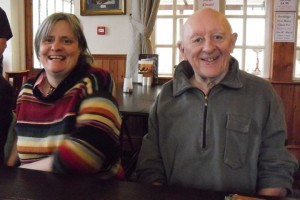
Enjoy reading this blog?
Click here to become a patron.


